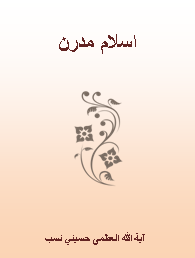
Modern Islam acording to
Grand Ayatollah Hosseini Nassab
“Modern Islam” at a glance
In Modern Islam, law, i.e., Shari’a, is explained and interpreted
based on high human ideals, which are the essence of the religion
of Islam. These ideals include rationality, justice, freedom, mercy,
chivalry, tolerance, empathy, ethics, human dignity, spirituality,
peace, rule of law, human rights, and attaining high moral states.
To derive Shari’a law, in addition to the Scripture and Tradition,
independent reason is applied to ensure that such a body of law is
compatible with human nature and rationality.
In that light, if a scholar or jurist issues an edict which stands in
contradiction to the principles of rationality, justice, natural
human rights, freedom of thought and expression, and high moral
states, then such an edict is deemed anti-Islamic, and following it
is considered a rejection of the high values of the Noble Qur’an.
In Modern Islam, the precious kernel of religion, which is Sacred
Devine Law, remains invariant; nonetheless, its directives are
interpreted and explained as the sacred law maker in Islam is
responsible for guiding humankind in the current period.
In Modern Islam, the general rules of jurisprudence, which are
constructed within the edifice of Shari’a, play an essential role in
understanding Islamic Shari’a law. These rules include tolerance,
no-harm, no-undue hardship, the assumption of correctness of
one’s deeds, respect for denominational beliefs, respect for
property, assumption of purity of things and of being halal, i.e.,
permissible to eat, unless otherwise ascertained, suspending
criminal sentences in the case of doubt, executing a directive
despite undue doubt, diminished responsibility, and responsibility
to fulfil one’s commitments, among others. Such rules guarantee
the generative nature of religious knowledge and the guidance
that the Devine Law brings for the present generation.
In Modern Islam, the Glorious Qur’an, as the Word of God and
the Final Testament, is considered the most important source of
law. Nonetheless, its interpretation should be consistent with
reason, human nature, invariant findings of science, and the
absolutely authentic narrations from the infallible Imams, which
are confirmed by rationality, justice and other mentioned human
values. Any interpretation or understanding of the verses of the
Qur’an, which contradict reason, human nature, morality, justice,
self-evident knowledge, and the invariant findings of human
sciences, is considered invalid.
In Modern Islam, narrations, which meet the criteria of
authenticity from the point of view the Principles of
Jurisprudence, the Science of the Narrators of the Tradition, and
the Science of Interpreting Narration, can be referenced as long as
they are consistent with the general spirit of Islam encompassing
rationality, justice, human rights, human dignity, and others
mentioned human high values.
In the event of a contradiction between a narrated hadeeth and
principal human values, principles of reason, and Devine human
nature, it will be determined that such a hadeeth does not meet
the main condition which is required for its validity, the reason
being that the infallible Imam’s words should never contradict
human nature, justice, rationality, and other sacred Devine and
human values.
In other words, in addition to the requirements of the
aforementioned sciences to assess the validity of a hadeeth, it is
also required that the hadeeth should be consistent with the
general spirit of Islam, which is based on rationality, justice,
human rights, and morality.
In Modern Islam, there are four dimensions for jurisprudence:
1. The spiritual dimension
2. The economic dimension
3. The social dimension
4. The governance/public administration dimension
The fourth dimension, i.e., the principles of public administration
and rules pertaining to governance, is determined based on the
present social context, and may vary in different times. Such
principles and rules include those concerning court judgments,
sentences, retribution , restitution, compensation, testimony, and
armed struggle, which depending on the time the Traditions were
issued, and extenuating circumstances may be reconsidered in
accordance with contextual factors, human values, and in
conformity with general jurisprudential rules.
The proud example of the infallible Imams in this matter is clear
evidence for this (contextual) approach (to jurisprudence),
instances of which will be presented in this publication.
In Modern Islam, the process of development of a community
should be all-encompassing, including its economic, social,
cultural, and political dimensions, while maintaining a balance
among them.
In Modern Islam, the economic regime is grounded in a theory of
economic development in which economic growth transpires in
tandem with distributional justice. Its ultimate goal is to eradicate
poverty and provide social welfare and justice for all members of
the society.
Economic freedoms granted to create wealth for individuals and
partnerships should also ensure protecting the under-privileged in
the society, since a large gap between the poor and the rich
always results in social disintegration and disorder.
Governments are responsible to create social justice by striking a
balance between accumulation of wealth and ensuring the under-
privileged, senior citizens, orphans, poor children, individuals with
disabilities, and women without protection, and other vulnerable
sectors of the society have a share in this prosperity.
If governments fail to do so, the public should rise to the occasion
and endeavor to spread social justice. In an Islamic society there
should be no poor person in need of food, medication, healthcare
, clothing, and shelter.
In Modern Islam, government is established based on democracy,
meritocracy, justice, tolerance, moderation, rationality,
independence, rule of law, legitimate freedoms, human dignity
and rights, accountability of the statesmen, equality of all citizens
before law, and providing for the basic needs of the
underprivileged sectors of the society.
Otherwise, institutions of religion should part ways with
government in order to preserve the sanctity of the Devine
Religion.
In Modern Islam, women, together with men, are active in the
social, scientific, cultural, political, and economic domains.
Women, as men, contingent upon the requisite conditions, have a
share in rising to the position of high guardianship, to the
leadership of the Islamic society, to become a religious authority,
and to the high positions of the country’s administration.
Book of "Modern Islam in Farsi:

|